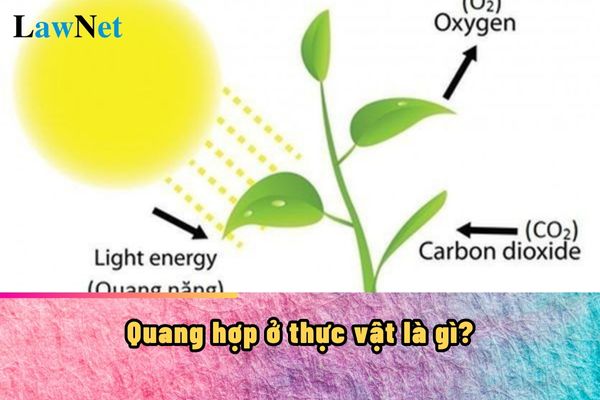What is photosynthesis in plants? When do students in Vietnam learn about photosynthesis according to the Natural Science curriculum?
What is photosynthesis in plants?
Photosynthesis in plants is a concept covered in the Natural Science subject.
Students can refer to following information to better understand before class.
|
What is Photosynthesis in Plants? Photosynthesis in Plants: Nature's Green Energy Factory Sunlight + Carbon Dioxide + Water → Glucose + Oxygen Main Stages of Photosynthesis: |
*Note: Information is intended only for reference./.

What is photosynthesis in plants? When do students in Vietnam learn about photosynthesis according to the Natural Science curriculum? (Image from the Internet)
When do students in Vietnam learn about photosynthesis according to the Natural Science curriculum?
Based on Subsection 3 Section 7 of the Curriculum for the Natural Science subject issued together with Circular 32/2018/TT-BGDDT, the content of the grade 7 Natural Science curriculum includes:
Energy and Life
- Concept of Energy
- Various Forms of Energy
- Energy Transformation
- Energy Dissipation
- Renewable Energy
- Saving Energy
- Biological Energy (photosynthesis in plants, cellular respiration)
Thus, according to the regulations, photosynthesis in plants will be included in the grade 7 Natural Science curriculum.
What are required competencies when studying the grade 7 Natural Science as stipulated in Circular 32 in Vietnam?
Based on Section 4 of the Natural Science curriculum issued together with Circular 32/2018/TT-BGDDT, it explicitly outlines the specific manifestations of scientific competencies in general, as well as for the grade 7:
| Component Competency | Manifestation |
| Natural Science Cognition | Able to present and explain core knowledge about the structural components, diversity, systematic nature, motion laws, interactions, and changes of the natural world. Specific manifestations: - Recognize and name objects, phenomena, concepts, laws, and processes of nature. - Present objects and phenomena; the role of objects, phenomena, and natural processes using forms of expression such as spoken or written language, formulas, diagrams, charts, etc. - Compare, classify, and select objects, phenomena, natural processes according to different criteria. - Analyze features of an object, phenomenon, natural process in a specific logical order. - Identify keywords, use scientific terminology, connect information in logical and meaningful ways, outline when reading and presenting scientific texts. - Explain relationships between objects and phenomena (cause-effect, structure-function, etc.). - Identify mistakes and correct them; provide critical assessments related to the discussion topic. |
| Exploring Nature | Perform basic skills to explore and explain natural and life phenomena. Demonstrate practical issues with scientific evidence. Specific manifestations: - Propose issues, ask questions for issues + Recognize and ask questions related to the issue. + Analyze the context to propose issues by connecting existing knowledge and experience and using one's language to express the problem proposed. - Make judgments and formulate hypotheses + Analyze the issue to present judgments. + Formulate and articulate the hypothesis to be explored. - Plan implementation + Build a logical framework for content exploration + Select appropriate methodology (observation, experimentation, investigation, interview, literature review, etc.). + Develop an exploration implementation plan. - Execute the plan + Collect and retain data from comprehensive results, experiments, investigations. + Evaluate results based on simple statistical analysis of data. + Compare results with the hypothesis, explain, draw conclusions, and adjust when necessary. - Write, present reports, and discuss + Use language, drawings, diagrams, and tables to express the process and results of exploration. + Write a report following the exploration process. + Collaborate with partners positively, listening actively, and respecting opinions and evaluations from others to receive actively and argue, defend exploration results persuasively. - Make decisions and propose opinions + Make decisions and propose solutions to the issues explored. |
| Applying Knowledge and Skills Acquired | Apply knowledge and skills in natural sciences to explain common phenomena in nature and life; issues of environmental protection and sustainable development; conduct appropriate behavior and solve simple problems related to oneself, family, community. Specific manifestations: - Identify and explain practical issues based on natural science knowledge. - Based on understanding and investigative evidence, propose solutions and implement some solutions for natural protection; adapt to climate change; have appropriate behaviors and attitudes for sustainable development. |

